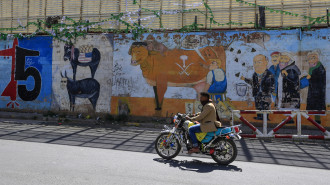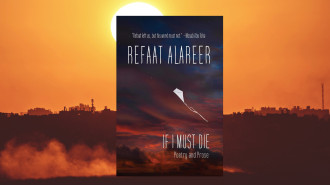All She Lost: A Lebanese women's 'herstory' of a nation fighting to survive
Few, if any, canons of Middle Eastern political history are written or narrated by women. For a nation-state like Lebanon whose modern history is marked by war, economic collapse and tragedy, this is especially true.
In the case of Lebanon's most recent catastrophe, the Beirut port explosion on 4 August 2020, the absence of a female narrative means that a telling of Lebanese history, as written and narrated by men in positions of privilege and power, could easily read as tales of war, heroism, nationalism and triumph. All She Lost speaks of a very different Lebanon.
It speaks of a Lebanon where there is electricity for anywhere between half an hour to three hours a day. A Lebanon where banks have frozen the life savings of hundreds of thousands of people due to the 2019 economic collapse so people cannot access their money. A Lebanon where you may need to travel the breadth of the country to find the antibiotics you need because no hospital or pharmacy has them.
"What All She Lost achieves is putting Lebanon firmly on the map for readers in the West; it is an education about Lebanon’s history and its women"
Its author, award-winning Lebanese journalist and journalism professor Dalal Mawad, was working for Associated Press in Beirut at the time and was one of the first to report on the aftermath of the explosion in early August 2020.
Soon after the explosion, Dalal and her daughter moved to Paris where she now works as a producer for CNN; the explosion was the final nail in the coffin that convinced Dalal that as much as Beirut was her home, it was now too dangerous a place to raise her young daughter.
After moving to Paris, Dalal read Belarusian Nobel Laureate Svetlana Alexievich’s book Chernobyl Prayer, a collection of testimonies from survivors of the Chornobyl disaster, using oral history as a medium to write historical non-fiction.
Inspired by the book and its format, Dalal decided to write something similar, but about the Beirut port explosion. However, the difference between her book and Alexievich's is that All She Lost is a collection of testimonies by women only.
In addition to the survivors’ stories, Dalal has written a concise political history of modern Lebanon from the era under Ottoman administration to its recent economic collapse and the Lebanese people’s fight to find out who was responsible for the 2020 Beirut port explosion and bring them to justice.
Dalal also writes a succinct summary of Lebanon’s sectarian factions and the many ways in which women are discriminated against, from widows still requiring a male custodian to obtain their children’s inheritance and reparation money, to laws that enable men to take full custody of their children upon divorce and in some situations even kidnap their children from their mothers with impunity. The level of discrimination varies from faith group to faith group as personal status laws are religion-based.
Initially, Dalal had not intended for All She Lost to be a collection of testimonies purely by women, but as she looked at previous interviews she had conducted as well as her contacts and sources, she realised most of them were women.
“I started thinking why not, I'm a feminist and history rarely gets written by women, even in the Western world. This could be a book by women about women,” Dalal Mawad tells The New Arab.
“Women are not only suffering but they are a vulnerable and marginalised group in Lebanon. Through their stories, you are telling the wider story of Lebanon's collapse and how the Lebanese are suffering. So, I started doing the interviews and realised, as I say in the book, that many of them were speaking in detail about the explosion for the first time and I discovered that on top of the explosion and on top of the economic crisis, they were survivors of decades of trauma and violence.”
The women featured in the book come from many different walks of life – from doctors and law students to migrant domestic workers and grandmothers who have lived through numerous wars, to Syrian refugees.
They all lost something on 4 August 2020 – family members and loved ones, their health, their homes and businesses, their dreams, and any shreds of hope or feelings of stability.
“These women are bearing witness to the condition of women in Lebanon and where they are marginalised and discriminated against by laws and because of the patriarchy. They're lurching from one crisis to another, and they never yield because a lot of these women use the explosion to take me back to other bouts of violence and trauma in their lives. By violence we're talking about violence, not in the restricted definition, so it can be anything from economic violence or domestic violence to war.”
"Herstory – a history written by women centring on women and written through a feminist lens, does not exist in the Middle East, making All She Lost one of the first books of its kind for Lebanon and the wider region"
All She Lost is both compelling in Dalal’s ability to transmit the female survivors’ stories and deeply touching in the moments in which Dalal and the women connect in their grief and talk of their loss, pain and current struggles.
What is evident from all the women Dalal interviewed is that they are united in placing the blame on the state for the explosion and the deaths of their loved ones.
The heart feels heavy as one makes its way through the book, at the realisation of how little coverage Lebanon has had in the media. All She Lost conveys the injustices, destruction, loss and pain to an extent that no news report on television or online article has before.
In a world where news outlets churn out bad news daily, we often become desensitised to the loss and suffering of others. What All She Lost achieves is putting Lebanon firmly on the map for readers in the West; it is an education about Lebanon’s history and its women.
— The New Arab (@The_NewArab) June 6, 2023 |
“I think not a lot of people in the West are up to date or realise the hardship and suffering of the Lebanese people and the state we’ve now reached,” says Dalal. “So, I think the first objective [of All She Lost] is informing people about what is going on. Secondly, I feel like Lebanon is forgotten by the world, so this is me putting Lebanon on the map and reminding the world. This book serves as a collective memoir of the Lebanese, of ordinary people. To me, as a journalist, it's important to document that part of history.”
In the Arab world, we often talk of “sumud” or resilience as a characteristic that many Arabs in war-torn nations own; however, in All She Lost, Dalal argues that the Lebanese people are not resilient.
Resilience suggests that you rebuild yourself and your country under better conditions and fight to free yourself from an oppressor. But Lebanon’s history proves that while its people find the strength to carry on, conditions have worsened rather than improved and people continue to vote for the same corrupt politicians.
Dalal highlights how some people in Lebanon continue to use their political party memberships and contacts to avoid accountability for crimes and to even get rid of those fighting for justice. For some, they use their alliances and contacts for less sinister purposes: to get jobs and access to medicine and healthcare, a system of wasta or ‘who you know’ – if you’re unfortunate enough not to know anyone, you find yourself in the most unprivileged of conditions.
“I think strength and resilience are very different,” Dalal explains further. “The women are forced to keep on going. I try not to label them, to be honest, to say they're strong or victims or survivors. I want to avoid these narratives. But they're adapting. They were forced to adapt. They were forced to move on because it's survival and sometimes they think they didn't have another choice.”
“For me, resilience as a concept is when something bad happens, but you reconstruct yourself, you reinvent yourself, you move to something better. Today the Lebanese are not moving, they're going backwards. They didn't liberate themselves from the political regime that has subjugated them and stolen their savings and is responsible for the explosion. What we see today is a nation living in a state of denial and amnesia. It's scary.”
— The New Arab (@The_NewArab) July 13, 2023 |
Herstory – a history written by women centring on women and written through a feminist lens, does not exist in the Middle East, making All She Lost one of the first books of its kind for Lebanon and the wider region. In Lebanon’s last parliamentary election in 2022, eight women won seats, a record number, which is shocking when you consider that make up only 6.25% of the parliament.
However, this does not mean that Lebanese women are not politically clued up or engaged. They are very politically active on a grassroots level; they were at the frontline of the October 2019 Revolution and many are engaged in activism work or members of feminist organisations. They are also at the forefront of the groups campaigning for justice for the victims and survivors of the 2020 Beirut port explosion, some of whom are featured in the book.
“It's very rare in the Middle East, in the Arab world, for women to write their own history and mind you, it doesn't mean they're not players or that they haven't been at the forefront of events including political events, whether it's in Lebanon or the Arab region, but no one talks about that,” says Dalal.
“These are ordinary women. These are not historians. These are not politicians. This is where oral history is very important because it's the uncensored version of history. When history is always written by men there's only one perspective that you're putting on the table and I think it's much drier; I know [this] because I've interviewed men and I've interviewed women and women have this very subtle way of telling you something that's really important and really big through small anecdotes that play with a lot of emotions, in a lot of colour, and you get the big picture. They're amazing storytellers. This is based on more than twelve years of journalism in the Middle East. Women are the best storytellers I've ever met.”
All She Lost is published by Bloomsbury and is out now
Yousra Samir Imran is a British Egyptian writer and author who is based in Yorkshire. She is the author of Hijab and Red Lipstick, published by Hashtag Press
Follow her on Twitter: @UNDERYOURABAYA








 Follow the Middle East's top stories in English at The New Arab on Google News
Follow the Middle East's top stories in English at The New Arab on Google News


